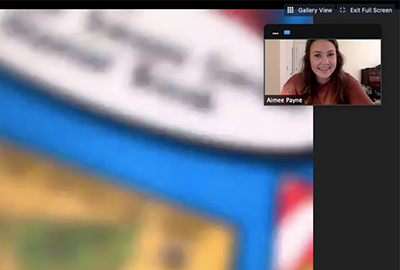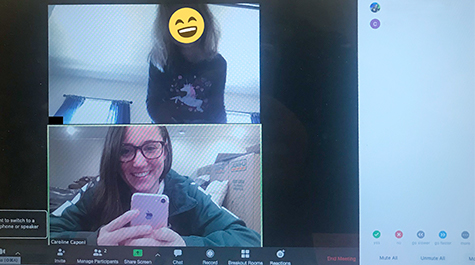W&M student teachers design virtual tutoring program to support local elementary students
Through a new virtual tutoring program, student teachers in William & Mary’s elementary education program are providing individualized instruction and support for up to 150 elementary-aged children who are learning at home during the pandemic.
The program launched on April 6, just two weeks after the W&M campus transitioned to remote instruction. The spring semester is a critical time for students in the School of Education’s teacher education programs because they spend between 10 and 15 weeks working full-time in schools as student teachers. With public schools closed, flexible and innovative solutions were needed to replace these field experiences and prepare students to graduate on time.
Kelley Clark, director of teacher education, brainstormed with a group of students to design a program that would give W&M students a unique opportunity to work directly with families, while also providing a much-needed service to the local community.
“We had three student teachers who really took off with this idea and formed a steering committee to bring the program to fruition,” says Clark. “These students are very service-oriented and are considering working in high-needs schools. They recognize the acute challenges this situation brings in terms of equity and access across our school populations.”
Kayla Aaron ’19, M.A.Ed. ’20 is one of the students who helped create the program. “I wanted to address the technology and opportunity gaps exacerbated by this pandemic,” she says. “Meaningfully participating in virtual school at the elementary level requires technology, including reliable access to the internet, as well as assistance from an adult, and these are resources many local students do not have. Through the virtual tutoring program, we hope to connect with a few of those students to support their educational growth.”
 William & Mary has a strong existing partnership with Williamsburg-James City County (WJCC) Schools, with a large percentage of its students completing their student teaching experiences in the division’s schools. Heidi Meadows, lead kindergarten teacher at James River Elementary School, has worked closely with W&M’s student teachers in the past and is the lead clinical faculty at James River, having completed specialized coursework and training in mentoring student teachers.
William & Mary has a strong existing partnership with Williamsburg-James City County (WJCC) Schools, with a large percentage of its students completing their student teaching experiences in the division’s schools. Heidi Meadows, lead kindergarten teacher at James River Elementary School, has worked closely with W&M’s student teachers in the past and is the lead clinical faculty at James River, having completed specialized coursework and training in mentoring student teachers.
“Partnering with Heidi and James River Elementary on this program was an obvious choice, because of the strong working relationship we’d already established,” says Clark. “The principal, Mike Stutt, has always been supportive and was immediately receptive to the idea. In addition, the school is one of the most socioeconomically diverse schools in the division, with about 70% of students qualifying for free and reduced lunch services. I knew W&M student teachers, in partnership with the wonderful teachers at James River, could make an impact there.”
Meadows asked the teachers at James River to recommend students who could use extra support with assignments while learning at home.
“A few groups came to mind as we identified students for this program,” she says. “First, I wanted to reach students who could use extra coaching and guidance. Helping students maintain academic skills is challenging in the best of times. This program allowed us an opportunity to continue to support students who benefit from extra support and individual coaching.”
James River has a large number of students whose home language is Spanish, so Meadows asked teachers to particularly consider students who might need extra support if caregivers aren’t fluent in English.
“Another group that came to mind is those students who have finished the assigned work quickly and who are wanting more,” adds Meadows. “So often, tutoring programs target students for remediation and support. This program provided an opportunity to offer services for those who need accelerated and more challenging work as well.”
The steering committee of W&M students created an intake process and carefully matched up student teachers with elementary students for the best fit. The student teachers then reached out to parents and teachers for introductory phone calls and to learn more about the students they’d be working with.
As tutoring sessions get underway, the student teachers are determining the mixture of services and supports that will be most beneficial for each student based on their own observations and the feedback of parents and teachers. The student teachers are assisting students with the learning packets provided by their schools and designing new learning activities.
“Since making contact with families, we have expanded our reach as we work with the siblings of our students,” says Aaron. “I work with kindergarten and fifth grade siblings, kindergarten and first grade siblings, a third grader and a fifth grader. I had my first sessions this past Friday, and the opportunity to work with children again was a bright spot in my week.”
For the teaching staff at James River, the program is strengthening their ability to reach and support students with quality, individualized instruction during the closure.
“It is always our goal to individualize instruction and make instructional choices that meet the unique and varied needs of our students,” says Meadows. “And we strive to include parents and caregivers in what we do to meet the educational, emotional, and social needs of our students. I envision the W&M tutors first and foremost being instructional support, but they will also be mentors to children who may be isolated, bored or struggling.”
 Providing tutoring services virtually is not without its challenges. Sessions conducted through Zoom limit the observational data that student teachers can collect to gauge students’ strengths and growth areas, says Aaron. And not having been in their classrooms, it’s hard to know what skills and content students have already been exposed to, making it difficult to design engaging activities for those students who have already completed the assignments provided by their schools.
Providing tutoring services virtually is not without its challenges. Sessions conducted through Zoom limit the observational data that student teachers can collect to gauge students’ strengths and growth areas, says Aaron. And not having been in their classrooms, it’s hard to know what skills and content students have already been exposed to, making it difficult to design engaging activities for those students who have already completed the assignments provided by their schools.
“I am confident that these difficulties will ease the more sessions we have, though, and hopefully my students and I will fall into a routine,” adds Aaron.
The greatest challenge, both in developing the tutoring program and in moving regular instruction forward, is reaching all students equitably, says Meadows. Many of their students do not have a reliable internet connection at home or technology to support learning in the virtual world. However, student teachers, along with support staff from both W&M and WJCC Schools, are working with each family on a case-by-case basis to identify solutions to overcome these hurdles.
Now into its second week of operation, the tutoring program is gaining momentum as student teachers establish working relationships with each family. The tutoring program will run through the end of W&M’s spring semester, providing about six weeks of individualized tutoring support for participating families.
As a formal part of their student teaching experience, W&M students are expected to reflect on each tutoring session, documenting what they learned during the session, including what worked, what didn’t and what strategies they will try next time. The cohort of elementary education students is also enrolled in a seminar class, in which they meet weekly via Zoom to share challenges and successes, and to get guidance from faculty members.
“W&M acted quickly to fulfill a need on their end by creating a program for student teachers to continue challenging, rigorous and innovative work while fulfilling a need on our end to provide individualized instruction to our students during the school closure,” says Meadows. “I am beyond grateful to W&M for taking the initiative to serve our students. It's what I know to expect from the program at W&M...commitment and leadership.”
